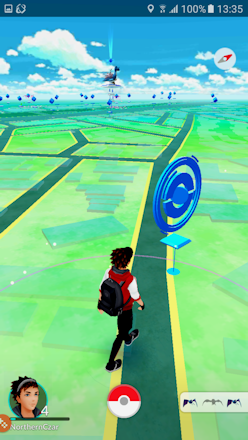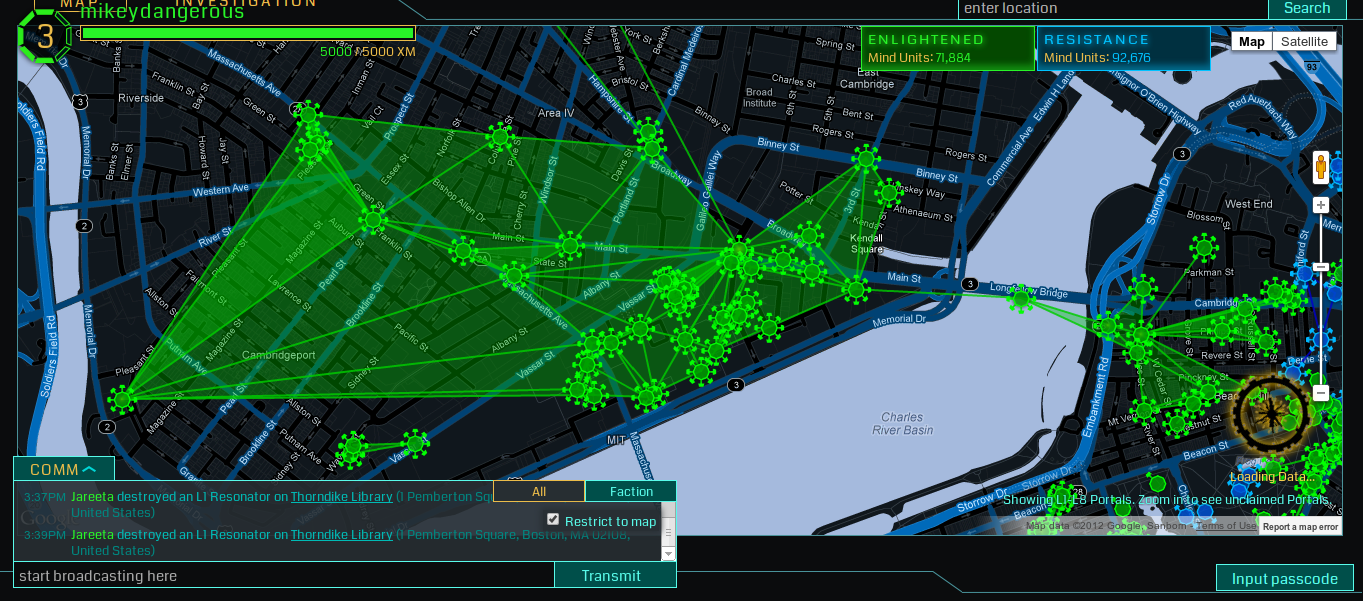When I was a teenager I was addicted to video games. Not stay-awake-for-three-days-and-die-of-starvation kind of addicted, but I would spend every conceivable moment playing.
While I enjoyed car games and classic shoot’em ups, my favourites were the more strategic kinds of games in which you could explore, think, and discover. There was always somewhere else to reach, something fascinating to find, another stratagem to try.
I ended up imposing a ban on myself in order to focus on my studies, and I did not lift a video gaming finger for years afterwards.
Then along came Ingress.
Ingress is a mobile game developed by Niantic (an offshoot of Google). You choose to join one of two factions that are fighting for world supremacy by capturing virtual portals – which are represented by public landmarks in the real world such as statues and fountains.
Ingress is oft described as an augmented reality game, but I disagree. It’s an alternate reality game. And it’s addictive. There’s something about covering a swathe of land in deep green (or blue, if you’re one of them) which elicits that sweet dopamine of achievement.
The plot isn’t real, of course, but that doesn’t matter. The emotion is.
Eventually I had to give up Ingress because I could feel my dubious history with video games flooding back, and I was chewing through my data like a hot knife through butter.
It is in this light that I look on with amusement at Niantic’s latest offering: Pokémon Go.
I was vaguely aware of this game since I maintain a general interest in augmented reality. Then one day it exploded. Suddenly everyone was playing it!
I hadn’t planned to play Pokémon Go myself, but given its sheer popularity I felt it would be remiss of me as an e-learning professional to forgo an informed opinion. So I gave it a go.
Frankly, it isn’t my cup of tea. Indeed I find the game a bit childish and pointless. When you catch one Pokémon, you catch another, and then another… ad infinitum. So what?
Still, I can see why others enjoy it. All the key game mechanics are there: it’s intuitive to play; your first Pokémon is easy to catch; you level up quickly; and the Pokédex is an interesting element that taps into the collector’s mentality.
You can also earn ownership of a gym (reminiscent of becoming a mayor in Foursquare) and you can incubate and hatch eggs (reminiscent of the parenting responsibilities for Tamagotchi).

Predictably, Pokémon Go has provoked a torrent of criticism from non-players, and I say some of it is warranted. From public nuisances to privacy concerns, the game has also fuelled discourtesy, disrespect, and self harm.
Personally I don’t think that you are stupid just because you play Pokémon Go. However, I do think the game is a vehicle for stupid people to express their stupidity.
I also think the decision to assign churches as gyms was ill advised, though I realise there is a technical reason for this and thankfully some churches are using their lemons to make lemonade.

On the plus side, Pokémon Go gets people walking – that’s unusual for a video game, even a mobile one – and it has single-handedly introduced millions of people around the world to the concept of AR.
And if we needed it, it’s yet another reminder to L&D folks that people love games.


I had to laugh at the comment you made on the “game is a vehicle for stupid people to express their stupidity.”. Like you, I got into Ingress and had a bit of fun with that for a while. It was weird getting notifications like, “Your Post Office is Under Attack” and then realise it wasn’t an emergency service announcement but an Ingress notification of a portal being overtaken by the Resistance. Ah, the fun and frivolity but back then people thought you were crazy for playing it. Now when everyone gets in on Pokemon, they think you’re the crazy one for NOT playing it. *Sigh* There’s no pleasing people…
Oh so you were a fellow member of the Enlightened? Bravo (and thanks for your comment).
I commented over on Quibb
http://quibb.com/links/pokemon-whoa
;-)
I have replied :)
Ryan – Thank you for the even handedness of your post. I’m with you on all counts. I did, however, see the social element in action awhile back, one group of people helping another group of people (whom they didn’t know) find a hard to get Pokemon in the area. I was delighted by the exchange. So, while the game itself is not my personal cup of tea, it is a great reminder that different people have different reasons for becoming engaged in an activity. It would behove L&D to realize that there is more than one way to create engagement with what we do.
Thanks Shannon. Yes, it’s a testament to the human spirit how a seemingly individualistic game can become collaborative, when the individuals are willing to help each other out. A lesson for L&D indeed!
I’ve never heard of Ingress! Which is really a shame, as the exploration aspect is what I like best about such games. We’ve had a piece on Pokemon as well – http://www.talentlms.com/blog/augmented-reality-learning/ – check it our if you’re interested!
Thanks Nikos, I’ll have a read.